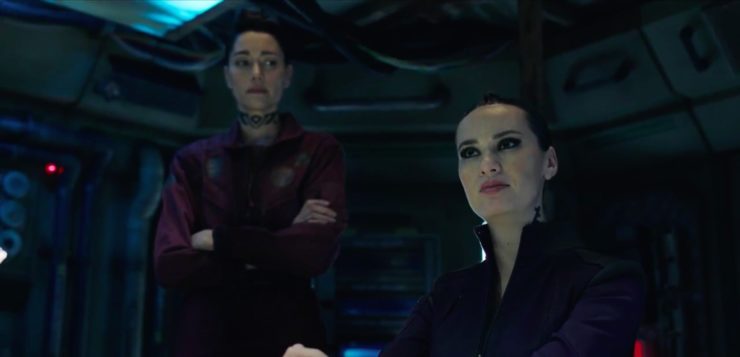Shall we take a tense and life-threatening trip around the system? Let’s.
Spoilers for episode 5, “Down and Out,” follow!
“Gaugamela” was a lot to take in as it was happening, but it was really just the beginning. The season’s first three episodes set such an elaborate stage—just to knock everything down in “Gaugamela” and then show us how much farther down they have left to go. Almost everyone almost died, and no one is safe. Not yet.
But there’s one large and distracting flaw in the plot this time: I didn’t believe for one second that Holden (or Bull! or anyone else on Tycho!) would fail to consider that Sakai might have sabotaged the Roci. Yes, they’re distracted, and grieving, and stressed to the nines. But the show made a point to give us not just scenes of Sakai working on the Roci, but Sakai and Holden on the Roci. He’s very aware that she didn’t just lead the repair project. She’s spent hours and hours in the guts (and on the hull) of his ship.
Having Holden and Bull not think of this feels like a fake problem meant to ramp up the (already high!) tension and let Naomi save the day. On that second front, I understand why the writers would want to use this structure. Naomi is largely helpless: she gave the Chetzemoka to Filip, so she can’t slip away even if Marco would let her (which, come on, he clearly wouldn’t). She has no access to comms or anything else, because Marco’s not an idiot. For her to have any effect on the plot, especially after her failed assassination attempt, it has to be her task to get that warning out.
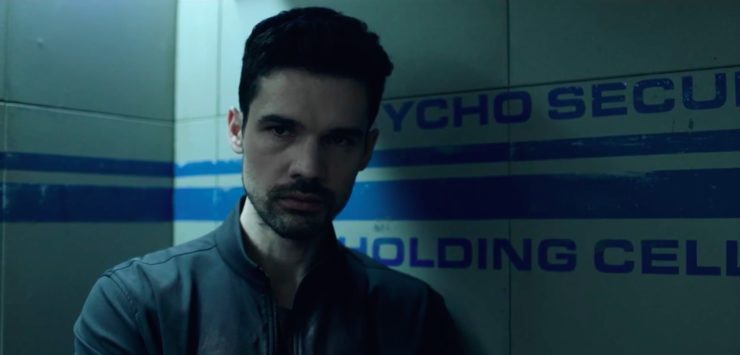
But there are too many clues (including that moment in the brig where Sakai almost seems like she wants to tell Holden something) that make the reality of the situation obvious to the viewer in a way that makes the characters seem to act dumber than they are. You can let the audience in on things (like Marco’s plans!) and use the resulting tension between what we know and what the characters know in really, really effective ways. But this isn’t one of those instances. The way it plays out requires us to accept that Holden wouldn’t have been concerned about Sakai’s time on the Roci. It doesn’t track. He talks about how the ship is his home; he would realize their traitor had been in his house, messing with things. Letting him ignore this feels forced, and it ultimately means that Holden also doesn’t really have anything to do this week.
Well, he does have to survive. And right now, that’s a lot.
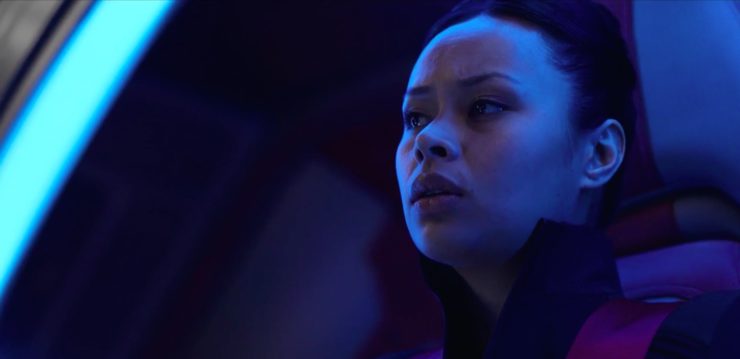
Avasarala presumably is fine, gathering her resources on Luna, so we don’t check in with her. Alex and Bobbie have finally put the last piece of the traitorous-Martians puzzle together: dealing weapons is practically small-scale when you can deal in ships. The audience has seen that Marco has Martian ships, but no one in the system knows this except Bobbie and Alex. The smaller attack on Mars is enough to tell Avasarala—if the intel on the ships gets to her—that it’s not the Martian government working with Marco, but some faction within the planet’s military. Imagine what the old lady can do with that information.
And imagine what a meeting with Drummer’s beautiful family and Marco will be like. In a show full of duplicity and secrets, it was a welcome relief to watch Oksana raise the issue of Marco’s message immediately, and for Drummer to share that information with her family. For one second, the show lets you think that maybe it’s Oksana who received this message, and that she’s considering betraying Camina—but it’s only for a second.
Buy the Book


A History of What Comes Next
The way Drummer’s crew reacts to the attack on Earth neatly balances all of Marco’s speechifying and posturing and grand words. He can’t protect or free all Belters. And like Oksana says, all Belters will have to answer for Marco’s actions. The pirates will have a harder time of it. There will be retaliation, because that’s what people do, Inner or Belter. Drummer’s crew gives voice to a different Belter perspective—one that walks the line between justifiable resentment of the Inners and realism about their precarious position.
The only moment Drummer gets to mourn Fred is when she defends him to her crew: “He was a good man, period.” Not just for an Earther. Drummer has lost both Fred and Ashford, now: her leaders, mentors, unexpected friends. They stood against Marco and they both died for it. When Drummer sits silently, listening to her crew talk, is she thinking about the leadership vacuum? Is she thinking about who will stand up against Marco now? Is she realizing she might be the only other option?
I love the way they all lean into each other when Drummer says they will meet with Marco. It says so much about how they work as a supportive unit—fear pushes them closer together. And I love that Drummer thinks of Naomi when she learns what Marco has done. It’s not that she’s worried about her friend’s safety, but that she knows how hard this will hit Naomi. There’s not a lot of time in this world for that kind of sympathy and grace, and there’s also something beautiful about steely Drummer being the one to show it. She’s changing. But she’s still a total badass. (And one still struggling with guilt about whether she could have stopped all of this when they had Marco in the airlock last season.)
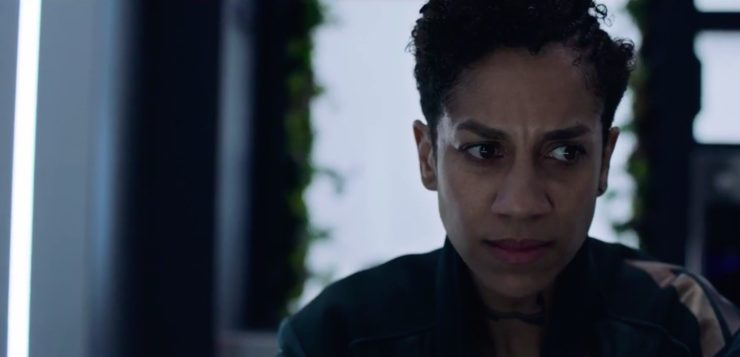
Belter perspective and experience is worked smartly into almost every plotline in this episode, from Sakai’s scorn at the idea of being an Earther’s favorite pet to the way Alex acknowledges that as Martians, he and Bobbie can take a hard burn longer—but the Belters know that, because they know their enemies. Naomi and Cyn argue about Marco’s actions and intent: all he can see is the ways the Inners have held the Belters down, and all she can see is the “river of blood” on which Marco’s new world is being built. Cyn also brings up the reality of the Belters and the ring worlds. Only some of them can survive on a planet’s surface, and those that can—are they Belters anymore if they don’t live in space? What defines them, beyond struggle and zero-g? What does Marco think about that? Does he even think about that?
Marco’s only actions this week are more cruelty: playing with Naomi (which infuriates Cyn, who still has a soft spot for her), and poking at his son about what Filip intended by bringing Naomi there. The little speech he gives Filip puts blame on Naomi for what she did “to all of us,” which is what, exactly? She left Marco and Filip. Marco takes this and twists it into a traitorous action against all Belters. Listening to him makes my skin crawl; every word is manipulation. When Filip tries to talk to Naomi the same way, well, he doesn’t have the skill. He wants to gloat, to display his power over her, and all he does is tell her something she wasn’t supposed to know. He’s the reason she can save Holden.
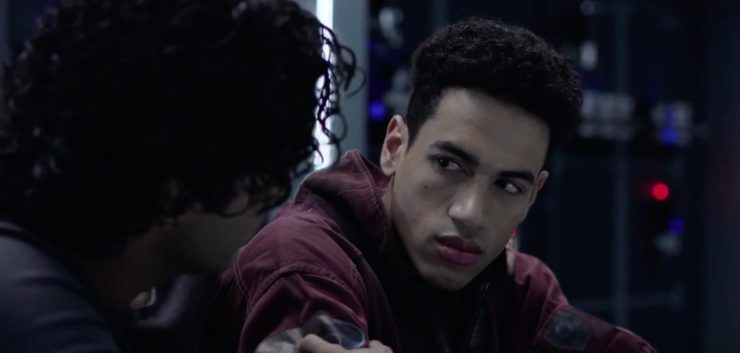
Meanwhile, down here in the land of gravity and asteroid hits, phew. PHEW. I can only imagine what it was like to watch that scene in the prison without having a book-reader’s comfort of knowing how it was going to go. (I still remember the visceral feeling of reading that sequence, which is one of the few times a book has made me feel claustrophobic.) There’s so much to love in this journey out of the underworld, from Peaches’ quiet determination (and heartbreaking inability to activate her mods) to Amos’s, well, leadership skills.
Can you imagine telling Amos Burton he’s a good leader? He’d scoff, or maybe just punch you. But he knows how to handle a crisis, and the moment in the depths of the prison stands in stark contrast to the time on Ilus when he couldn’t help. Amos will reach for violence when it seems the only form of help he can give, but this isn’t the first time he’s understood how to manage people. I’m thinking of the end of season three, when he brings Anna (I miss Anna!) to Monica, having seen first-hand that Anna can guide people through just about anything. But I’m also thinking of how he takes the risk of going to Erich in order to help Charles, a man he’s just met.
Holden wants to save everyone, on a grand, system-wide scale. Amos, though, will help whoever is in front of him if they need help. It’s not a desire like Holden’s, not a drive. It’s what needs doing.
Amos approaches the situation with a mechanic’s sharp competence and his own standard approach to people, which is that all of them are on the same level. There’s no hierarchy: you do this thing, and you do this other thing, and we will get through the big awful thing. He sees a problem and looks for the fastest logical solutions: Pull the door. Check the elevator. He knows how things are built and how to work with what he’s given. I would extremely like to have him around in a crisis.
Is it smart to keep calling Konecheck “Tiny”? Absolutely not. Would Konecheck have tried to kill Amos anyway? Absolutely. The characters in this scene are props, to a degree, though Rona is clearly intended to remind us that everyone affected by the catastrophe is a person with a family and a life. If you follow that thought to its logical end, the weight of what’s happened even just within the prison lands: this quartet of people climb up ten levels, and as far as they can tell, no one else is alive. Now extrapolate that to the rest of the planet.
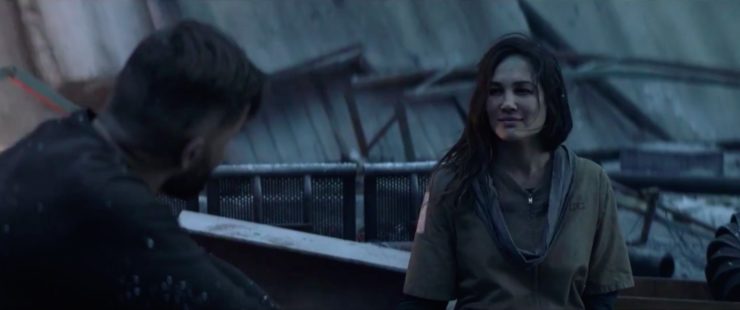
Ending on the silent scene of Bobbie and Alex hurtling off into space is a vicious cliffhanger of a choice, but it fits: With all the threat and instability of this episode, not everyone is going to be ok at the end of it. There are glimmers of light: literal daylight, yes, but also that Holden knows that Naomi is alive. He has a quest again. On the other side of this, they’ll want to be doing work that matters, but Holden needs that now, too.
I can’t believe we’re halfway through the season already.
Molly Templeton lives and writes in Oregon, and spends as much time as possible in the woods. You can also find her on Twitter.










